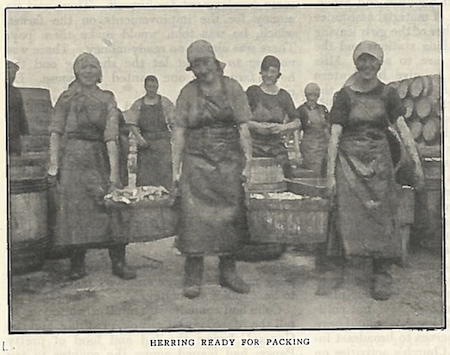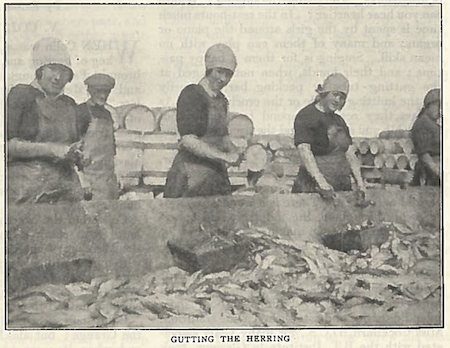
Friday May 22 2020

With the Fisher-Folks
By the Rev. J. A. NICHOLLS, Cambusnethan
Convener of the Sub-Committee on Deputations to Fishing Stations
AS one breakfasts on the tasty fresh herring or accepts it in one or other of its prepared forms, there is not always present to the mind the magnitude of the herring trade, whether regard be had to the capital involved, the numbers employed, or the risks to life and property which the toilers of the deep have constantly to face.
The Church, however, views the situation from the point of view of the men and women on boats and in curing yards who gather at the various centres in Scotland and England during the fishing seasons and receive the ministrations of preachers and lady-deputies for their guidance and comfort when far from home and in new surroundings.
Each year the vast army of workers is furnished with young recruits; and the shepherding of these amid many temptations is a task that must lie close to the heart of the Church. The minister with an evangelical message and a kindly sympathy is always welcome, and his Sunday services are eagerly sought after.
The ladies who dress the salt sores and cuts on the hands of the ‘gutters’ and tend the men too, when necessity arises, who meet the trains and boats as they arrive and see the girls off when they leave for home, who visit them in their huts and lodgings and entertain them in the rest-houses in their ‘off’ hours, do a work which is highly valuable, and is as highly valued by the workers.
In these days, when “Welfare” is on every social programme and the law requires a nurse in each centre, the rest-houses are miniature infirmaries and dispensaries, besides being churches, recreation halls, and, in some cases, restaurants as well. All of them are well equipped and exceedingly attractive and comfortable.
The Church of Scotland, working in conjunction with the United Free Church, and on the social side, with the Free Church, takes its full share in every effort made to better the lot of the fisher-folks, and it is a notable fact that for over half a century she has cared kindly for them. A deep debt of gratitude is due to those, who, year after year, have so worthily and willingly given their services to this cause.
A sum of £750 is spent annually by the Christian Life and Work Committee in the supply of literature, the advertising of services, the hire of halls, the equipment of dressing-stations and rest-houses, and the travelling and other expenses of deputies. To meet this the cordial support of congregations is desired.

Each year to Barra, Stronsay, Peterhead, Lerwick, and sometimes Stornoway, in Scotland, and to Yarmouth and Lowestoft in England, ministers and lady workers are sent, who serve in distinctive ways the Gaelic and the English sections. A large number of the girls hail from the Highlands and Islands, and they value greatly the word spoken in the Celtic tongue.
Recently applications have come for workers from Irish and Welsh centres, as our Scottish folk find their way to all the herring ports. Assistance has been given when deemed advisable; and as new stations are opening up, the active responsibility of the Church bids fair to increase. The last year or two have been trying, and in many cases disastrous, for the fishermen on account of stormy weather, uncertain fishing, and the heavy cost of maintaining the steam drifter which has taken the place of the old-time sailing boat.
The men deserve all the help and heartening we can give them; for they are a fine class, and the consolations of religion mean much to them. There is little pessimism among them, even in the worst times. Those who have ministered to them agree that no congregation is more inspiring to preach to than one composed of fisher-folks. And then-the singing! Where can you hear heartier?
Between Yarmouth and Lowestoft in a season a body of some 16,000 Scottish folks is engaged, and the writer has often preached to 1200 people at an evening service in the first-named port. In Stronsay a congregation of between 500 and 600 is a weekly experience. The fisher-folks like their “ain man” and are pleased to think that the church is thinking of them.
Website by Adept